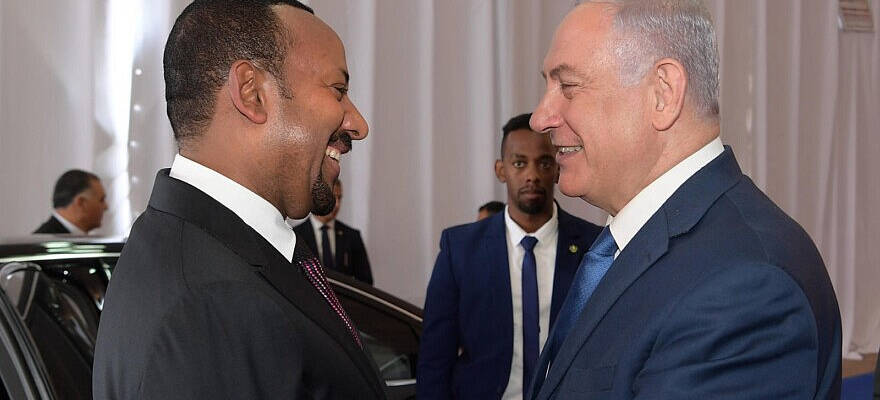The Jerusalem Center for Public Affairs and Ethiopian government think tank signed a Memorandum of Understanding at Jerusalem summit.
By Shimon Sherman, JNS
The Jerusalem Center for Public Affairs (JCPA) and the Ethiopian government’s Institute of Foreign Affairs think tank have signed a Memorandum of Understanding (MoU) in an example of what JCPA president Dan Diker called “bottom-up diplomacy.” The agreement will lead to broad cooperation between the two institutes on issues of national security, agrotech and food and water security.
Yechiel M. Leiter, director-general of the JCPA, stressed the importance of the MoU, saying, “National security is not just a matter of tanks and planes and soldiers. It is bread. It is the ability to feed the people of one’s sovereign territory.”
Leiter further explained that in his view “food security should conceptually move from the social and economic realm to the realm of national security.”
The MoU signing came as part of a broader summit led by the JCPA titled “Trusted Regional Partnerships at a Time of Shifting Alliances” that took place in Jerusalem over the past week.
According to a statement from the JCPA, the purpose of the summit was to “discuss the prospects for enlarging and enhancing the Abraham Accords and the potential areas for Gulf-Africa-Israel partnerships in the fields of counterterrorism and national security, food and water security and environmental concerns.”
The summit brought together delegates from 30 Middle Eastern and African states. In addition to Israel, representatives from Bahrain, Chad, Djibouti, Egypt, Ethiopia, Ghana, Iran, Jordan, Kurdistan via Sweden, Kenya, Kosovo, Liberia, Malawi, Mauritania, Morocco, Namibia, Nigeria, Saudi Arabia, Somalia, Somaliland, South Africa, South Sudan, Tunisia, Turkey, Uganda, the United Arab Emirates and the United States were present.
Identifying with Israel
According to Diker, the summit expanded on a new multifaceted diplomatic approach that could enhance Israel’s influence throughout the region. Diker stressed the importance of cooperative partnership in developing regional relations for Israel.
“A lot of African and Middle Eastern states are identifying with Israel because we are not encroaching on them, unlike the other powers that have been approaching them like Russia or Iran or China,” Diker told JNS.
“Israel generally drives initiatives that are good for its security or technology. By contrast, this summit is building a regional strategy that is based on partnership, and in that scene, the Abraham Accords have allowed us to set up relationships that are not transactional but rather cooperative,” he added.
Diker further expressed the importance of Israel being seen as a strong country for furthering relations with other countries in the region. “Most of these countries certainly see Israel as powerful—militarily, technologically and diplomatically. Ultimately that is one of the most important factors that make Israel an attractive partner,” Diker said.
The final element of the newly emerging diplomatic paradigm is “bottom-up diplomacy,” meaning the development of mutual ties between NGOs and other non-governmental entities in an attempt to ease the path for broader diplomatic relationships on the government level.
“Academia and think tanks can and must play a key role in fostering responsibility,” Leiter said.
“We are unencumbered by politics and political interests, like government, so that we can think and plan with wholesomeness and integrity. Nor do we have private interests at our core, like the private sector,” he added.
Diker agreed with this, telling JNS, “It is clear to us that bottom-up diplomacy between people and institutes, whether it be shared research initiatives or shared policy initiatives will lead to top-down diplomacy between governments.”
Moving Closer
The summit showed promising signs of warming ties between Israel and its neighbors both due to mutual interests and mutual threats.
After Saudi Arabia signed a diplomatic agreement with Iran last month, many analysts said that the door to further peace initiatives in the Middle East was closed. Experts at the JCPA said that they received a different impression from the summit delegates.
“We understood from our Saudi friends and our Bahraini friends that the move was not directed at Israel and that peace was still on the table,” Diker emphasized.
Furthermore, many delegates actively expressed their desire for Israel to counter “fake news” that is making it difficult for them to develop closer ties with Israel.
Iran specifically and violent radicalism generally also played a role in delegates calling for closer ties between Israel and its neighbors. Throughout the conference, multiple delegates pointed to Iran as a major destabilizer in the region and expressed their belief that closer ties between Israel and their countries could serve to counter that instability.
“Iran is a regime that simply can not be trusted and whose ultimate goal is to spread its control throughout the Middle East. This is an effort that must be countered by a broad alliance,” said the delegate from Bahrain.
A delegate from Nigeria echoed this sentiment, saying, “Much of Africa is threatened by radical militias including Shia ones that operate on a similar model to Hezbollah. In order to bring true prosperity to the region the threat of radical violence must be blocked and this can be achieved through cooperation.”
According to Diker, the conference also achieved practical diplomatic successes, with certain delegates openly expressing interest in normalization.
He said that the delegates from Somalia and Somaliland “were very interested in moving on the diplomacy path and were definitely engaging in discussions with their own elected officials.”
He added that, beyond the MoU, JCPA was invited to partner on several other projects.
“Other countries across the Arab and African world have already invited us to cooperate on a number of initiatives along the lines of water security, food security and agrotech,” Diker said.
Leiter stated that the end goal of the initiative was to “bring together the financial resources of the Gulf States, the technological resources of Israel and the human resources of Africa.”
